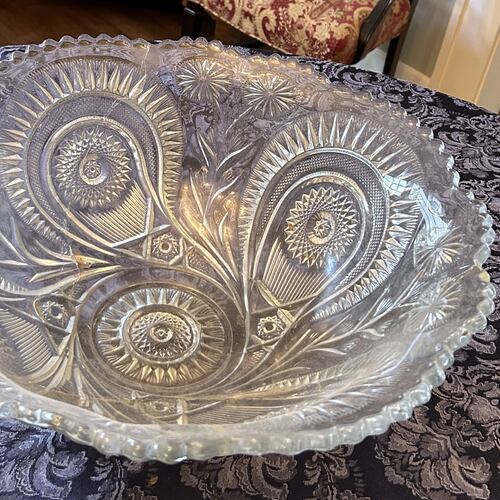If challenged, Jason Griggers could, with the aid of some glue, a comb and a flat iron, transform a woman’s hair into the shape of a helicopter. The only thing missing would be the swooshing sound of blades.
With a little dye, some hair pieces and a whole lot of determination, he could make it look as though a peacock had alighted atop a woman’s head, its tail rustling as it settled onto its perch.
He could do it. We’re certain of it. Why?
Because over the years as a competitor at the semi-annual Bronner Brothers International Hair Show in Atlanta, Griggers has coiffured locks into the following: A replica of a carrot. A mermaid’s mane with sea shells riding each undulating wave of hair. A blunt cut as severe as an isosceles triangle.
Then there was the banana. A Swarovski crystal-encrusted banana, yellow and ripe for the peeling, with big green leaves made of hair so stiff it appeared ossified.
That banana won Griggers a first-place trophy in the fantasy competition at a Bronner’s show earlier this year. It joins the bevy of trophies he has earned over the past decade at the storied African-American hair extravaganza, where you’d better be bold if you want to win.
The next Bronner show begins Saturday at the Georgia World Congress Center and is expected to draw 60,000 cosmetologists from across the country. Griggers won’t be competing, but he’ll be there demonstrating his flat iron prowess.
At their best these industry-only shows are performance art. At their worst they are spectacles of double-blink, cover-your-mouth camp. On stage, Griggers has delivered both. Rail thin and a bit of a dandy, a little on the short side and very much on the blond side, Griggers is a fairly soft-spoken guy.
Shy, though? It depends. He really didn’t need to call attention to himself at Bronner Brothers. A white stylist working in the world of black hair isn’t exactly a common thing. Winning contest after contest, doing things with hair that not every stylist could (or would want to do), is even more remarkable. But declaring himself “the Rosa Parks of hair,” as Griggers did at a show a few years back? It’s a moment he’ll probably never live down, even if he wants to live up to it.
Precision and speed
The other day in his private room at Vibez Beauty Salon on Metropolitan Highway in southwest Atlanta, Griggers was executing not the baroque styles that have brought him notoriety, but the kinds of low-key hairdos that pay the mortgage.
The warm, cramped chamber smelled sweet and acrid, like floral conditioner and a mild electrical fire. Tiffany Green-Abdullah of Stone Mountain occupied the styling chair. Part-comb-press-curl. Part-comb-press-curl. Griggers tag-teamed her tresses with both flat and curling irons. A coiled bob was quickly coming to life.
Three more women waited on a nearby bench. One was Arretta Benton-Gilbert. The Atlanta Public School teacher has sat there many a day. About 10 years ago she was searching for a new stylist. Her sister told her about Griggers.
“She said, ‘Hey, there’s this white guy you might want to go to because he really makes your hair move,’ ” Benton-Gilbert said.
A white guy? Good with black hair? Really?
Benton-Gilbert went on faith and stepped out of the salon with hair that, as promised, moved. She was a convert.
Soon, “I stopped telling him what I wanted and just let him do it,” she said.
If churches are still some of the most segregated venues around, beauty and barber shops are right behind them. Expressing your faith can put you in a vulnerable state. You want to do it in a place where you feel safe, among kindred souls.
Likewise, when your hair is standing all over your head, slathered with a chemical straightener that resembles Greek yogurt, or is being woven with hairpieces, you don’t want just anybody to see that. You want someone who understands, who gets it. Griggers has made it his business to get it.
A breakout star
Three years ago, comedian Chris Rock came to Atlanta to make a movie about the multibillion-dollar black hair care industry. More importantly, his documentary, “Good Hair,” explored the politics and the consuming relationship African-American women have with their hair.
Much of the movie centered on the infamous “Hair Battle” at the Bronner’s event, the spectacle at this heavyweight championship of hair shows, where top stylists from around the nation clip and flip models’ hair in Vegas-worthy productions. There were two breakout stars of the film. One was Buckhead stylist Derek J. The other was Griggers.
Griggers, the sole white stylist in the battle footage, chose to make his infamous analogy to civil rights heroine Parks with Rock’s cameras rolling. When the movie was released in 2009, critics and viewers latched onto the brazen remark, which landed him an appearance on the equally brazen Wendy Williams Show.
Since then he’s filmed a television pilot for a reality show about single dads (he and his ex-wife share joint custody of their 8-year-old son, London). He’s supposed to film a pilot for another reality show in the coming weeks. This one, Griggers said, will be all about him.
The 41-year-old is quick to say he can style any type of hair on any person of any hue. Almost. If you want the Halle Berry look, or dreadlocks like his ex-wife wears, don’t come to him. And then there are the styles he doesn’t like to do.
“I had to put finger waves in somebody’s hair two weeks ago,” he said as he finished the final spiral on Green-Abdullah.
Everyone in the room caught their breath, aghast that anyone would request a look as outdated as rippling, scalp-hugging finger waves. Griggers looked ashamed. Or was it chagrined?
Funny he’d feel that way about a style that actually opened doors for him. Certainly he’s not the first white man to do black women’s hair. In fact, there were already a couple of white stylists working at the salon when he came looking for a job almost 18 years ago. But when he walked in, he stopped shop owner Carol Morrow cold.
“He had finger waves,” Morrow said. “They stood straight up like a pompadour. It was like MC Hammer.”
Morrow decided to be impressed rather than put off. She gave Griggers a chance to be her assistant.
Hair his ‘medium’
Growing up in the seven-stoplight town of Brewton, Ala., Griggers thought he’d become a doctor. Chemistry proved too tough. He thought he’d be a backup dancer for R&B groups. That didn’t work out either.
But he’d always done hair on the side, from the manes of his dad’s horses to the nylon strands of his sister’s dolls. So he went to cosmetology school in Alabama, where half the students were African-American. Griggers found he could do things with black hair that seemed to defy gravity.
“Hair was the medium I found to express myself,” Griggers said.
At first, customers at Morrow’s salon were skeptical. “They would say, ‘No, not him,’ ” Morrow said.
He got used to hearing it. It didn’t stop him. Every opportunity to shampoo, set — or, he admits, steal — a client of an overbooked colleague was a chance to show what he could do. To show he understood that what these women wanted — whether they were judges or strippers — was a look that gave them confidence, that helped them navigate in a world where hair, particularly black hair, can send signals. Are you a team player? A non-conformist? With each conservative, layered cut, weave and bob he did, Griggers showed he got it.
“Pretty soon, all they wanted was the white boy,” Morrow said.
‘I’m going to stay’
Griggers was invited to participate in a Bronner Hair Battle for the first time in 1999. Mamie Bell, the show’s producer, said he’d built such a reputation that she thought his skill was more important than his race. Still, a skinny blond dude with a long blunt cut did add novelty to the event.
“There was nary a white face in the place,” Griggers said. “People were almost turning their noses up at me. It was saddening.”
He understood, though, that the Hair Battle is all about the show. Cutting hair while hanging upside down is nothing. Been done too many times. One contestant cut hair under water. Competitors must constantly up the ante.
For his first battle, Griggers brought in some of his best clients, dancers from the Gold Club strip lounge, for a presentation called “Angels in Disguise.” They danced (fully clothed). He cut hair. When it was over he walked away with $10,000 and a title belt so big it swallowed his tiny waist. And that was his Rosa Parks moment.
He’s not a stupid man. He knows the comparison is viewed by some as arrogant and sacrilegious. His explanation: I was playing to Chris Rock’s cameras when I said it.
Still, he said it. Now, he says, what he meant was: “Rosa Parks sat down and said, ‘No, I’m not going to go.’ And when I came to Bronner Brothers, I said, ‘I’m going to stay. I’m going to stay in my field. I love doing hair.’ ”
Since his debut 11 years ago, he has been in the Hair Battle three more times, competed in smaller events like the Bronner Fantasy Competition, and has served as a judge for other hair bouts. Bell says she wants him to retire from competing, though. She likes him well enough. She’s even one of his clients. It’s just time to give new faces a shot at winning, she said.
There’s also the matter of his 2007 Hair Battle, during the filming of “Good Hair.” His presentation, titled “Grown & Sexy,” had him frolicking on a round bed covered with rose petals and a half-dozen or so gorgeous women swathed in diamonds and lacy lingerie. Double blink. Oh, and he did their hair in sexy, soft layers to match.
“I saw that and I was like, ‘OK, this is really over the line,’” Bell said. “Now the hair was beautiful, but the audience was shocked.”
It made for good cinema. Since his appearance in Rock’s movie, Bronner has seen a significant uptick in the number of white cosmetologists attending its shows, trying to break into competition, Bell said.
Still proving himself
Some of Griggers’ trophies stand sentinel atop cabinets in his styling room, like giant Oscars glowing in the lamp light.
That will soon change. He plans to open his own shop later this year. With him will go his client roster of athletes’ wives, celebrities, public relations executives and just plain folks.
“This has been my home for so long, it’s what I know, it’s where I’m comfortable, you know?” Griggers said. And pretty much everybody’s over the fact that he’s the white guy.
“Once or twice a year I’ll have a new client say, ‘Oh, um, he’s white. Are you sure you can do my hair?’ I just say, ‘I’m gonna do the best I can with what I’ve got to work with.’”
As he combed out Green-Abdullah’s curls, she smiled at her reflection in the mirror. He tousled her locks into place. Her hair moved.
The next woman in the queue, a first-timer from Gwinnett County, took her seat in the big chair. Rebekah Hart had come to Griggers after seeing him in the movie.
“When I saw him, I said, ‘That’s my hairdresser.’ ”
Yet, she wanted to make sure he understood what she’d come for.
“Now, I’m not one of those peacock girls,” she said. “I like it simple.”
With a sure hand Griggers separated her hair into sections. He dabbed creamy relaxer on the roots of her thick brown hair, and just smiled.
About the Author
Keep Reading
The Latest
Featured



